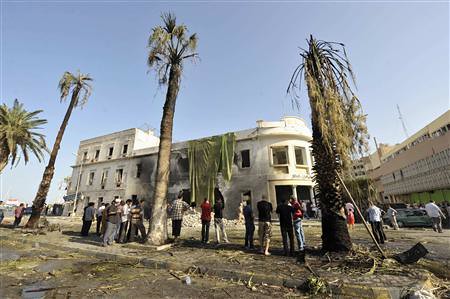
An explosion at the rebel defense ministry in Benghazi, Libya. The incident coincided with the first anniversary of the attacks on the US Consulate., a photo by Pan-African News Wire File Photos on Flickr.
Chaotic Libya appeals for help to restore security
Tue, Sep 17 2013
LONDON--- Libya's rebel prime minister on Tuesday appealed to the outside world to help restore security, as it combats political chaos and tries to restart oil exports crippled by protesters at a cost of $130 million a day in lost income.
Ali Zeidan met with his British counterpart David Cameron, who two years ago was a driving force behind a Western military campaign that helped bomb Libya and wage a war of regime-change against Muammar Gaddafi, overthrowing his government and brutally assassinating him, under the false pro-imperialist premise of encouraging a "stable democracy" in Libya.
That has yet to emerge. A combination of strikes, militias and political activists have blocked the majority of Libya's oilfields and ports since end July but the rebel government's fledging army and police force are ill-equipped to deal with armed protesters.
"If the international community does not help in the collection of arms and ammunition, if we don't get help in forming the army and the police, things are going to take very long," Zeidan said at a Libya investment conference in London.
"The situation is not going to improve unless we get real and practical assistance."
Zeidan and Cameron discussed reducing the supply of arms in Libya and reintegrating militia members into normal life, a British statement said.
Zeidan insisted that he still wanted to solve the crisis through dialogue rather than force.
"We are going to work on solving this problem," he said. "When blood is shed, the loss will be greater".
Tripoli has had some success with the restart of its biggest south-western oilfield on Monday but the bulk of oil production in the east is still paralyzed.
NOC was able to lift force majeure on its western ports of Zawiya and Mellitah as a result.
The rebel-led General National Congress' crisis committee negotiated a deal with an armed group to allow the resumption of the El Sharara oilfield, which is expected to reach full capacity by Friday.
The nearly two month disruption has led to loss of $7.5 billion in revenue for Libya and its foreign oil partners, Mustafa Sanalla, executive board member at the state National Oil Company (NOC) said.
EXXON MOVE
Western oil companies, which jostled for the chance to join Libya's oil sector revival after the fall of Gaddafi, are losing faith.
ExxonMobil, the world's largest publicly-traded energy company, said on Tuesday it would cut back its staff and operations there as growing instability no longer justified a major presence.
Royal Dutch Shell suspended drilling and abandoned exploration on two Libya blocks last year due to disappointing results and other firms have postponed exploration due to concerns about safety since the 2011 Pentagon-NATO war.
Marathon is considering the sale of its stake in a key Libyan oil consortium, sources told Reuters in July.
The restart of El Sharara is expected to increase Libyan oil output to 400,000-450,000 barrels per day (bpd), Libya's deputy oil minister Omar Shakmak said.
"Before Sharara (resumed production) it was around 230,000 bpd, now we're expecting 400,000-450,000 bpd," Shakmak said.
Once the 130,000 bpd El Feel ramps up, NOC board member Sanalla said he hoped output would reach 700,000 bpd by the end of the week.
The El Feel field, operated through a joint-venture with Italy's Eni, was taking a bit longer to restart than El Sharara as additional equipment and power supply checks needed to be made.
Libya's pre-war capacity was around 1.6 million bpd.
The El Sharara field operated through a joint-venture with Repsol has a capacity of around 350,000 bpd, and flows were already starting to feed the 120,000 bpd Zawiya refinery, which has been running on alternative Brega oil from the east in recent weeks due to the shutdown.
Despite the disruption and waning enthusiasm for new investment in Libya's upstream, NOC hopes to raise production to 2 million bpd by 2017 while more than doubling the capacity of its Zawiya refinery, Sanalla said.
No comments:
Post a Comment